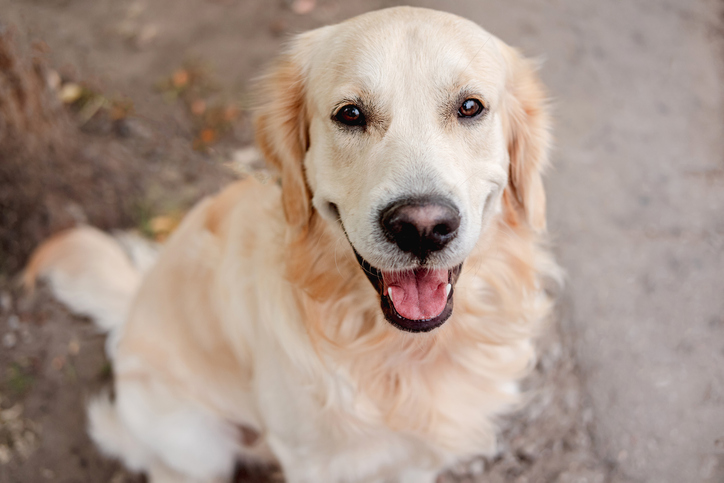Golden Retrievers: Life Span, Temperament & More
Golden Retrievers are one of the most beloved breeds in the UK. With their friendly nature, intelligence, and golden coats, they make excellent companions for individuals and families alike. But is this affectionate breed the right fit for your lifestyle?
In this guide, we’ll cover everything from the Golden Retriever life span, temperament, and physical traits to their exercise needs, health considerations, and more. Whether you’re a first-time dog owner or considering adding another pup, this article will help you make an informed decision about owning a Golden Retriever.

Quick Facts
Breed Name: Golden Retriever
Nicknames: Goldie
Breed Group: Gundog
Origin: Scotland
Size: Medium to large
Golden Retriever Life Span: 10–12 years
Golden Retriever Average Weight: Males 30–34kg; Females 25–32kg
Temperament: Friendly, intelligent, gentle
Exercise Needs: At least 1-2 hours daily
Are Golden Retrievers Good With Kids? Yes, they’re famously gentle and patient with children
History of the Breed
What were Golden Retrievers bred for?
Golden Retrievers originated in 19th-century Scotland, where they were bred by crossing Yellow Retrievers with the now-extinct Tweed Water Spaniel. They were bred to create the perfect gundog for retrieving game from both water and land.
Their friendly personality and exceptional trainability soon made them very popular. Today, Golden Retrievers are loyal family pets, but also therapy dogs, guide dogs, and search-and-rescue heroes.
Lifespan & Health
How long do Golden Retrievers live?
The Golden Retriever average life span is typically around 10 to 12 years. With proper care, such as a balanced diet, routine vet checkups, and plenty of exercise, many live long, happy, healthy lives.
Common Golden Retriever Health Problems
Like all breeds, Golden Retrievers can be prone to some health conditions. It’s important for prospective owners to be aware of these issues:
- Hip and elbow dysplasia
- Cancer
- Heart disease
- Eye issues
- Skin conditions and allergies
Early screening and regular vet check ups can make a big difference in managing or even preventing these problems.
Temperament: Traits & Personality
The Golden Retriever temperament is one of the breed’s most cherished qualities. They’re often described as:
- Gentle: Naturally calm and patient, especially with children
- Intelligent: Highly trainable and quick learners
- Sociable: They thrive in social settings and love meeting people and other pets
- Loyal: Form deep bonds with their families and enjoy being involved in daily activities

Physical Characteristics
Golden Retrievers are beautiful dogs with friendly faces and flowing coats. Key Golden Retriever characteristics include:
- Size: Medium to large
- Golden Retriever Weight: Males 30–34kg; Females 25–32kg
- Height: Males 56–61cm, Females 51–56cm
- Build: Strong, athletic, and well-proportioned
- Coat: Dense, water-repellent double coat
- Golden Retriever Colours: Varying shades of cream to deep gold
Do Golden Retrievers shed?
Ye, Golden Retrievers shed a lot, especially during spring and autumn. Their thick undercoats require regular brushing (at least 2–3 times per week) to manage moulting and reduce tangles.
When do Golden Retrievers stop growing?
Most reach their full height by 12 months, but they continue to fill out and mature until around 18–24 months.
Training & Socialisation
Are Golden Retrievers easy to train?
Yes. One of the most admirable Golden Retriever traits is their eagerness to please. This makes them exceptionally easy to train, whether for basic obedience, agility, or more advanced roles like therapy or assistance work.
Key training focus areas:
- Loose-lead walking
- Recall and basic commands
- Crate and toilet training
- Calm behaviour around children and other pets
Socialisation from an early age is vital to avoid potential behaviour issues like separation anxiety or excessive excitement.

Looking After a Golden Retriever: Are They Right for You?
Before bringing home a Golden Retriever, it’s important to consider whether your lifestyle aligns with their needs.
Golden Retrievers are:
- High-energy: They need at least 1-2 hours of daily exercise including playtime, walks, and mental enrichment
- Social: They crave companionship and don’t enjoy being left alone for long periods
- Intelligent: Without stimulation, they can become bored and develop undesirable behaviours
While grooming is manageable with regular brushing, the emotional and exercise needs of a Golden Retriever require an active and committed household.
FAQs
Is a Golden Retriever a good family dog?
Yes, Golden Retrievers are gentle, patient, and affectionate, making them an excellent choice for families with children or other pets.
What are the most common problems with Golden Retrievers?
Golden Retrievers are prone to hip dysplasia, cancer, allergies, and heart conditions. Routine vet care and a healthy lifestyle can reduce risks.
What is the hardest age with a Golden Retriever?
Many owners find the “teenage” phase (6–18 months) the most challenging due to increased energy and testing boundaries. Consistent training helps this stage go smoothly.
What’s the difference between a Retriever and a Labrador?
While both breeds are similar in size and temperament, Golden Retrievers have longer coats and a gentler demeanour, while Labradors tend to be more boisterous and have shorter, denser coats.
Can Golden Retrievers be left alone?
Not for long periods. They are highly social and may develop separation anxiety if left alone frequently.
Are Golden Retrievers high maintenance?
They require daily exercise, mental stimulation, and lots of companionship.
Do Golden Retrievers shed?
Yes, and quite heavily during seasonal changes. Regular grooming is essential to manage this.
Need help caring for your Golden Retriever?
At Barking Mad Dog Care, we know that Golden Retrievers thrive on love, attention, and routine. Whether you’re going to work, planning a weekend away, or enjoying a holiday, we offer home-from-home dog care that keeps your Golden happy and well looked after.
With one-on-one attention, experienced hosts, and a safe, loving environment, Barking Mad is the perfect solution when you can’t be there.
Find your local Barking Mad branch today and give your dog the tail-wagging holiday they deserve, whether its a Golden Retreiver, Staffordshire Bull Terrier or Cockapoo!




